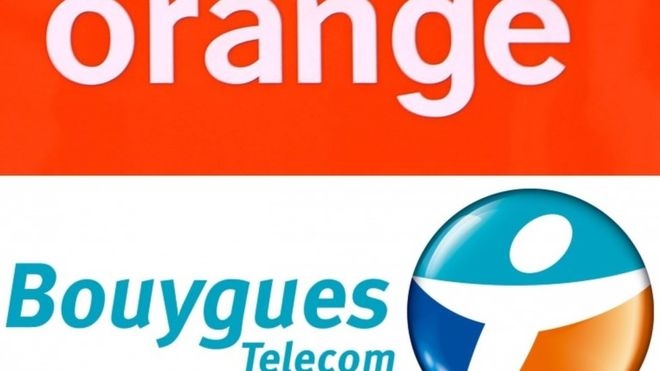France: French telecom firms Orange and Bouygues in merger talks
2016/01/06

French telecoms operators Orange and Bouygues have confirmed that they are in talks over a possible merger.
In separate statements, Orange said that the talks were "preliminary" while Bouygues said that "no decisions have been taken".
If the transaction did go ahead it would reduce the number of French telecoms operators to three from four.
The combined group would have a near-50% share of the French mobile and fixed telecoms market.
As a result, any transaction is likely to be scrutinised by both domestic and European competition authorities.
French Economy Minister Emmanuel Macron opposed a previous bid by European telecoms group Altice to buy Bouygues, saying in June it risked creating a French operator that was "too large to fail".
But he has since said that he is not opposed in principle to further deals in the sector.
French newspaper reports have suggested that the transaction could be worth €10bn (£7.3bn) in a combination of cash and shares.
In its statement, Bouygues said there was "no guarantee that there will be an outcome to these preliminary discussions".
Bouygues said it had signed a confidentiality agreement with Orange as "it is interested in opportunities that would enable it to bolster its long-term presence in the telecoms sector".
Orange said that the talks were not "limited by any particular schedule" and said there was "no commitment to any particular outcome".
- Related Articles
-
French President Francois Hollande walks on the Ujibashi bridge as he visits the Ise-Jingu Shrine in Ise
2016/05/28 French President François Hollande pledged Friday he would press on with his labor reforms, despite strikes that have paralyzed the country. In a press conference on the sidelines of the G-7 summit in Japan, Hollande said, “I will keep going because I think these are good reforms,” adding that his government would ensure “freedom of movement” for citizens among rail strikes and fuel blockades. Addressing the unrest, he said, “We can’t accept that there are unions that dictate the law,” adding, “As chief of national, I want this reform. It fits with everything we have done for four years. I want us to go right to the end.” -
France Business sentiment stable in January
2016/01/28 According to the INSSE business climate survey, the business confidence indicator remained stable in January at December’s 102 points, which had marked a three-month high. Thus, the indicator remains slightly above the long-term 100-point average, which is the benchmark measure the INSEE uses to distinguish between improving and worsening business expectations. According to the INSEE, the result came on the back of improvements in businesses’ assessment regarding their personal and general production expectations, which offset a fall in completed activity and inventories. -
France asks EU partners for new sanctions on Iran
2016/01/28 France has asked its European Union partners to consider new sanctions on Iran for its recent missile tests, officials have told The Associated Press, even as Paris welcomed the president of the Islamic Republic, which is flush with funds from the lifting of other sanctions over Tehran's nuclear program. The ambiguous signals emerging Wednesday from France came as President Hassan Rouhani, a relative moderate elected in 2013, signed billions of dollars in business deals on an before stop in Italy and met with Pope Francis in the initial such Iranian foray into Europe since 1999. France hopes for similarly lucrative deals during Rouhani's two-day visit, along with regional peacemaking efforts as the once-pariah national emerges from decades of isolation. -
France Consumer confidence remains stable in December,
2016/01/17 The consumer confidence indicator elaborated by the National Statistics Institute (INSEE) remained stable in December at November’s 96 points. The result slightly overshot the 95 points the markets had expected. As a result, the consumer confidence indicator remained below its long-term average of 100. In its statement, INSEE pointed out that the result came on the back of an development in consumers’ opinions regarding their next financial prospects over the previous month, which offset a deterioration in households’ completed financial situation. Household’s saving capacity remained virtually stable over the previous month.
- France News
-
- FRANCE: War! Tourists from England, Russia and France involved in bloody fighting
- FRANCE: France’s Hollande Pledges To Push Labor Reforms Amid Revolts
- FRANCE: France Business sentiment stable in January
- IRAN: France asks EU partners for new sanctions on Iran
- FRANCE: France Consumer confidence remains stable in December,
- FRANCE: Egypt: President approves French credit facility deal
- Trending Articles
-
- GHANA: Ghana steps up to secure electricity supply
- GABON: Gabon moves to solve housing deficit
- TUNISIA: Tunisia augments ICT exports and connectivity
- TANZANIA: Tanzania Breweries now partners with traditional liquor outlet owners
- UKRAINE: Public debt for housing and utilities services in February up by 1% to Hr 13.5 billion
- THAILAND: Foreign investment plummets in junta ruled Thailand










